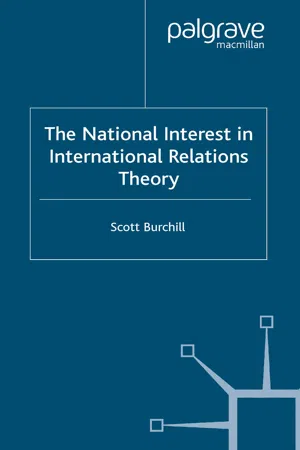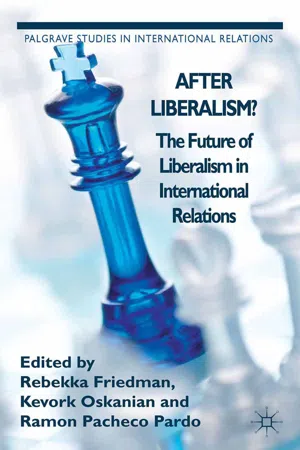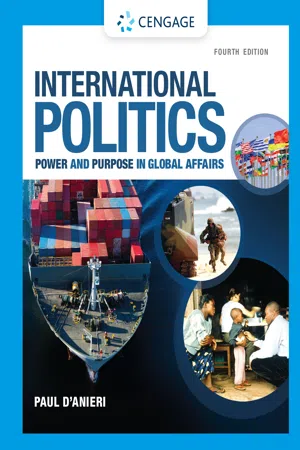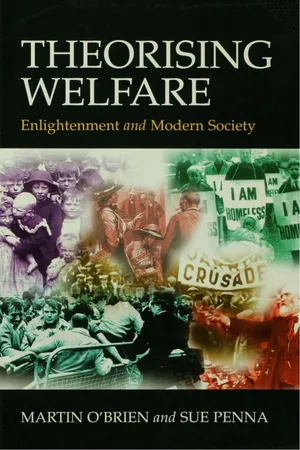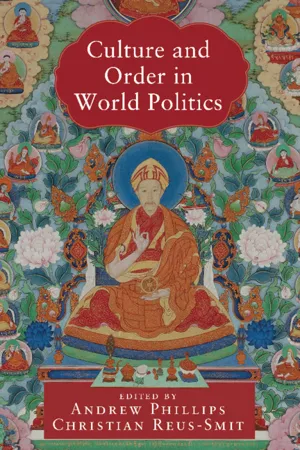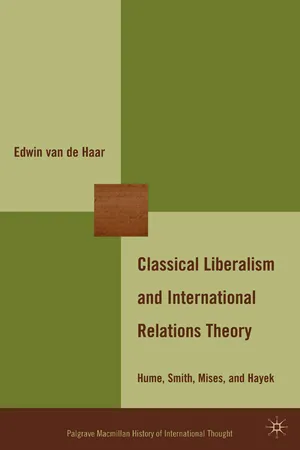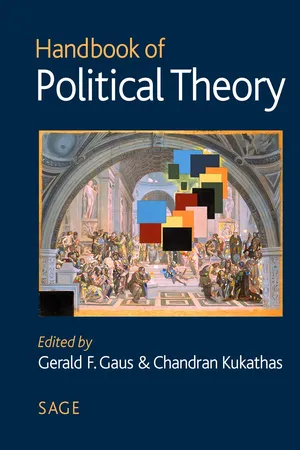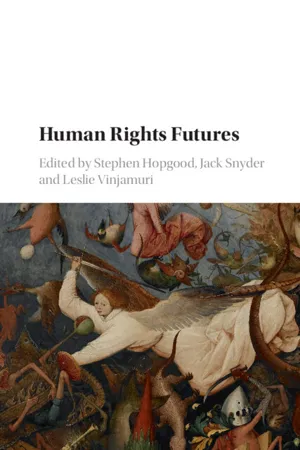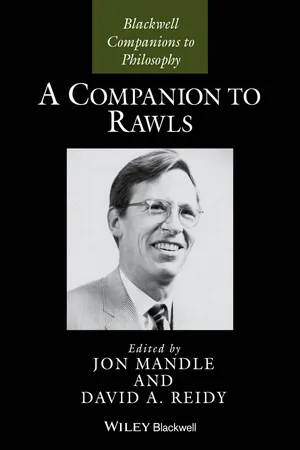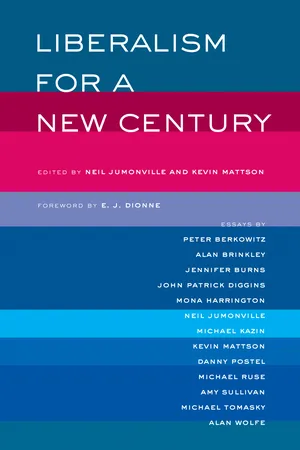Politics & International Relations
Liberalism
Liberalism is a political ideology that emphasizes individual rights, freedom, and equality. It advocates for limited government intervention in the economy and society, and supports the protection of civil liberties and human rights. Liberalism also promotes the idea of a social contract between the government and the governed, with an emphasis on democracy and the rule of law.
Written by Perlego with AI-assistance
Related key terms
1 of 5
10 Key excerpts on "Liberalism"
- S. Burchill(Author)
- 2005(Publication Date)
- Palgrave Macmillan(Publisher)
Because it is such a broad philosophical church, Liberalism contains within its boundaries a number of sometimes conflicting and contradict- ory sub-groups and traditions. These include economic liberals who focus Progressive Perspectives: Liberal Approaches 105 on the promotion of market relations as the optimal form of economic organisation, political liberals who regard the spread of liberal-democracy as an antidote to conflict in the international system, and moral liberals who believe that the universal adoption of human rights benchmarks will gradually improve the condition of the species. These are not necessarily discrete factions within Liberalism, though Macpherson has characterised conflict within liberal philosophy as a division between the market view of human beings as consumers maximising their utilities and the ethical view of humans striving to realise their potential (Macpherson 1973, p. 24; see also Richardson 1997). The tension between these various schools and their intersection with conservative political ideology accounts for a variety of attitudes towards the nation-state as an actor in international politics, and to national interests as the primary objective of diplomacy. Although this analysis will concentrate on the anti-statist, pro-market philosophical stream within liberal thought (sometimes called the neo-liberal school), and how it conceives of the idea of national interests, it will also note a range of alternative conceptions which are inherent within other branches of the tradition. The chapter will begin with an explanation of Adam Smith’s classical theory of the national interest, which underwrites market Liberalism generally. The revival of liberal international thought after the Cold War will then be assessed.- eBook - ePub
After Liberalism?
The Future of Liberalism in International Relations
- R. Friedman, K. Oskanian, R. Pachedo Pardo, R. Friedman, K. Oskanian, R. Pachedo Pardo, Kenneth A. Loparo, Ramon Pacheco Pardo, R. Friedman, K. Oskanian, R. Pachedo Pardo, Ramon Pacheco Pardo(Authors)
- 2013(Publication Date)
- Palgrave Macmillan(Publisher)
In the second section of this chapter, I will therefore try to recapture the core of Liberalism by bridging the very divisions that lead to these partial conceptions. To this end, I will return to John Locke’s pre-disciplinary formulation of protoliberal principles, which explicitly theorise the connections between their core aspects and their political dynamics. This Lockean account of Liberalism and its political dynamics, moreover, is broadly substantiated by the historical development of Liberalism.Viewed through the lens of this alternative concept, recent history shows neither a “rise” nor a “fall” of Liberalism. Instead, the shifts that undoubtedly characterise this period simply indicate Liberalism’s adjustment to the power political opportunities and constraints provided by the international system. In short, they are shifts in form rather than substance. What comes “after Liberalism”, I therefore conclude, is simply a different register of Liberalism.Liberalism – DividedDuring the 1990s, a wide range of policies was prominently associated with Liberalism. Among them were the liberalisation, deregulation, and privatisation of the international economy, the development of the World Trade Organization (WTO), and the transformation of former communist into capitalist states – in short, neoliberal economic policies. Proactive democracy promotion, as well as the widespread attempt to establish liberal market democracies as solution to failed, conflict-ridden, or even simply authoritarian states played an important role in the foreign policies of liberal states, of NGOs, and of international organisations and institutions, and gave rise to the notion of “liberal peacebuilding”. Liberalism was also associated with the proactive protection of human rights, not least in the form of humanitarian intervention as well as with plans to reform international law and international organisations in accordance with “a world of liberal states” (Clark, 2009; Keohane, 2003; Slaughter, 1995).In contrast to this spread of liberal norms, practices, and institutions, power politics generally associated with realism characterised the prior Cold War period. Capitalism, free trade, and free market principles were confined to the Western sphere of influence and tempered, domestically and internationally, by considerations of political stability. Democracy promotion was equally restricted and generally trumped by power political considerations; hence extensive alliances with authoritarian states and interventions in support of sympathetic rather than democratic regimes predominated. Human rights were generally subordinated to the principle of sovereignty. In short, the “rise” of Liberalism was associated with the increase in policies explicitly designed to spread liberal norms, practices, and institutions. And it was the retreat from these policies towards the end of the 1990s and a more explicit turn towards traditional power politics after 9/11 that seemed to indicate a “fall” of Liberalism. - No longer available |Learn more
International Politics
Power and Purpose in Global Affairs
- D'Anieri, Paul D'Anieri(Authors)
- 2016(Publication Date)
- Cengage Learning EMEA(Publisher)
The politi-cal theorist John Locke and later liberals argued, contrary to Hobbes, that individuals could freely join together to form governments that would protect them from anarchy without resorting to authoritarianism. The limitation of state power and the guarantee of the rights of individuals are still the core of Liberalism (which, in contemporary usage, is often simply called democracy ). The central philosophical insight of liberal international theory is that it is possible to overcome the worst aspects of the realist world. Indeed, liberals argue, because the world described by the realists is so dangerous, states and other actors have a powerful incen-tive to try to escape from that system, or at least to moderate its worst effects. Whereas realists are utterly pessimistic about the possibility of doing so, liberals are a bit more optimistic. They do not necessarily see people as “good” or inherently peaceful, but they do see people as being smart enough to recognize the problems created by international anarchy and to work to overcome them. The most prominent assumption shared by all liberals is that people are rational and understand their interests. This faith in human reason leads domestic liberals to believe that liberal democracy is the best form of government and leads international liberals to believe that rational, self-interested states and leaders can overcome the problems of anarchy. Liberalism is a much more diverse body of theories than realism, however, and is therefore more difficult to summarize coherently. This book highlights three different strands of liberal theory, each of which departs from realism in a different way and each of which focuses on a different level of analysis. One way to depart from realism is to rethink the implications of anarchy. This school, known as liberal institutionalism, agrees with realism that anarchy creates a security dilemma in which states’ efforts to gain security cause insecurity instead. - eBook - PDF
Theorising Welfare
Enlightenment and Modern Society
- Sue Penna, Martin O′Brien(Authors)
- 1998(Publication Date)
- SAGE Publications Ltd(Publisher)
1 Liberalism A good deal of confusi on surrounds the word 'libera lism', a confusion which is only exacerbated when it is prefixed by 'neo ' or when the word is preceded with a capital 'L ' -as in the Liberal Democrats. The confusion stems partly from misread ings of what libera ls have had to say on human welfare and partly from deeply entrenched views about the existence of a unifying libera l ideology -often seen as entirely indiv idualist ic, inegal i-tarian and reactionary. Such understandings betray only a very lim ited appreciation of the wealth of polit ical, philosoph ical and theoretical contribut ions that liberal ism has bequeathed to contemporary social thought and polit ical action. Even the term 'Liberalism ' itself can confuse the series of analyses and polit ical programmes tha t liberal thinkers have advocated and implemented since the eighteenth century Enlightenment. As John Gray (1989) points out, it is more realistic to think in terms of liber-alisms, in the plural, as a col lection of related philosophies about the roles and functions of ind ividuals, groups and insti tu tions in managing, direct-ing and controlling the character and progress of human social life. Some libera l thinkers are individualistic in the extreme, stressing personal autonomy and freedom as the only goal of social organisation; others, whilst maintain ing a commitmen t to individual freedom, are more open to the promotion of collective strategies for social and polit ical develop-ment. Some view state interference into social life as inherently evil or dangerous; others view such interference as justifiable in order to bring about progress and enlightened reform. The history of Liberalism is a history of change and reorientation as well as a history of intellectua l div is ion and polit ical dispute. There is not a single, unif ied, liberal ideo-logy which can be used to explain the formulation and implementa tion of social polic ies. - eBook - PDF
- Andrew Phillips, Christian Reus-Smit(Authors)
- 2020(Publication Date)
- Cambridge University Press(Publisher)
It has variously been a ‘map’ illuminating the path to a better world and a ‘survival guide’ to be used in the face of impending global calamity. Liberal internationalism has varied in its vision of how universal or global it is or can be as an order. It has been conceived as a political formation of various shapes and sizes: European, Anglo- American, Western, free world, and global. Liberal internationalism embodies a contested set of ideas and agendas – contested from outside by rival ideologies and political projects, and from within the liberal tradition itself. Despite these shifts and tensions, liberal internationalism has several core ideas that have travelled across the centuries and decades. One is about openness. Trade and exchange are understood to be constituents of modern society, and the connections and gains that flow from deep 10 For a survey of the varieties and historical shifts in the liberal internationalist vision, see Ikenberry 2009. Liberal Internationalism and Cultural Diversity 143 engagement and integration facilitate peace and political advancement. Second, there is a commitment to some sort of loosely rule-based set of relations. Rules and institutions facilitate cooperation and create capaci- ties for states to make good on their domestic obligations. Third, there is a view that liberal international order will entail some form of security cooperation. This might not take the form of alliances or a formal system of collective security, but states within the order affiliate in ways to increase their mutual security. Fourth, there is an expectation that liberal international order will move states in a progressive direction, defined in terms of liberal democracy. The order provides institutions, relation- ships, and rights and protections that allow states to grow and advance at home. - eBook - PDF
Classical Liberalism and International Relations Theory
Hume, Smith, Mises, and Hayek
- Kenneth A. Loparo, Edwin van de Haar(Authors)
- 2009(Publication Date)
- Palgrave Macmillan(Publisher)
Undoubtedly, some will be surprised by the argument, because a significant number of current classical liberals have been rather happy to embrace the moral high ground in international affairs, as associated with many of the social liberal posi- tions to be discussed in the second part of this chapter. Therefore, they 126 ● Classical Liberalism and IR Theory will be surprised to learn that classical Liberalism in international relations entails for example the rejection of the relation between peace and trade, or the calm acceptance of war as a regular institution in international affairs. Still, the theory outlined below is a consistent application of the classical liberal principles and views, which calls for reflection and then rejection of the previously held positions. Insofar that a number of classical liberals have taken a long hike from international reality, it is now time for them to face the difficulties and the ugliness often associated with world politics. Perhaps this process is made easier by the fact that a key aspect of classi- cal Liberalism is its application of the same core principles to domestic and international politics, while acknowledging the differences between these two spheres of political action. The ultimate goal of classical Liberalism in international affairs is the same as in domestic politics: to maximize indi- vidual freedom for all people in the world. The outline of the theory follows the presentation of the classical lib- eralism elements in chapter 2. This is a straightforward way to show that the theory is indeed classical liberal and that it follows the same bottom-up approach to politics. In the process, the relation with the Grotian position in English School theory is emphasized. In the second part of the chapter, the main differences with other Liberalisms in IR theory are highlighted. The Individual and Freedom International relations are all about human action. - eBook - PDF
- Gerald F Gaus, Chandran Kukathas, Gerald F Gaus, Chandran Kukathas(Authors)
- 2004(Publication Date)
- SAGE Publications Ltd(Publisher)
Liberalism, says the comprehensive liberal, is a robust position in political philosophy, a position whose moral par-tisanship reaches deep into the foundations of our conceptions of person, freedom, and value [see further Chapter 8]. The general difficulty that I have outlined, and the two kinds of response to it, have not always been a staple of discussion in liberal political philo-sophy. Many of the canonical figures in the liberal tradition are unapologetically ‘comprehensive’ lib-erals in the sense that their conceptions of social order and their elaborations and defences of free-dom and equality are patently rooted in a deep and extensive vision of the human person and of the ethical significance of human interaction in society. I have already mentioned John Locke’s argument for toleration. Locke’s more general theory of poli-tics (his theory of inalienable natural rights, his cri-tique of slavery, his contractarianism, his argument against absolutism) also has a straightforwardly Liberalism, Political and Comprehensive 91 comprehensive character. It rests on the axiom that men are ‘all the workmanship of one omnipotent, and infinitely wise maker; all the servants of one sovereign master’ – God – ‘sent into the world by his order, and about his business’, and that ‘they are his property, whose workmanship they are, made to last during his, not one another’s pleasure’ (Locke, 1988: 271). One might also mention the political philosophy of Immanuel Kant. Kant’s basic princi-ple of right – ‘An action is right if it can coexist with everyone’s freedom in accordance with a uni-versal law’ (1991: 56) – is presented as part of a metaphysical system that makes rational sense of our ability to distinguish those aspects of force and constraint that are a necessary part of any social order from those that are condemned by the value we attribute to freedom. - eBook - PDF
- Stephen Hopgood, Jack Snyder, Leslie Vinjamuri(Authors)
- 2017(Publication Date)
- Cambridge University Press(Publisher)
It is mistaken, all things considered, to claim Liberalism for human rights in their current form, as if those who worry about other values were not equally, if not more, liberal in their commitments. A corollary is that it would be far better for political scientists to start intramurally, with more engagement with theory, if the support they want to offer the human rights movement is to be more convincing than it has been so far. Most of all, political theory can remind scholars of international relations of the high aspirations liberals in modern history have entertained, before a series of catastrophic events lowered the sights of today’s scholars to the defense of human rights alone. Why Liberalism Marginalized Human Rights Like all traditions, Liberalism is an invented one. Duncan Bell has recently shown that there is no historically stable core to “Liberalism,” in spite of the attempts of a series of philosophers to locate it; and, if so, it is far better to write genealogically of an evolving and always contested concept that changes its own past even as it alters it present commitments. 2 With this understanding, the historian of human rights can observe that the place of her concept within the larger shifting constellation of liberal values has never been fixed. Nor is it adequate to assume that once a foundational 2 Duncan Bell, “What Is Liberalism?” Political Theory 42, no. 6 (December 2014): 682–715. Edmund Fawcett, Liberalism: The Life of an Idea (Princeton: Princeton University Press, 2014), makes some of the same points in a less theoretically acute but more accessible way, though unfortunately sidelining empire. However, Fawcett plausibly writes that to grasp Liberalism, “liberty is the wrong place to begin” (4; see further chapter 11 on rights as “new foundation” for Liberalism). Human Rights and the Crisis of Liberalism 263 role for rights has been laid, perhaps by John Locke, the die is cast for our own future. - eBook - ePub
- Jon Mandle, David A. Reidy, Jon Mandle, David A. Reidy(Authors)
- 2013(Publication Date)
- Wiley-Blackwell(Publisher)
all well-ordered societies.Despite the cynicism of some commentators, others have accepted Rawls's vision of international politics on its own terms – at least to the extent that it has allowed them to discuss and analyze some of his ideas in a productive manner and to speculate as to what they might bring to our understanding of various aspects of world politics. There were early examples of such writings (Brown 2002; Wenar 2001), but somewhat of a sea change was signaled with the publication of Rex Martin and David Reidy's volume (2006), which included a series of prominent and thoughtful contributions. It was an important demonstration that LP is a serious work with much to offer. More recent publications on a range of issues suggest the book is increasingly recognized as one of Rawls's key texts, exemplified by critical discussions of LP with regard to the World Trade Organization (Maffettone 2009), human security (Agafonow 2011) and climate change (Gardiner 2011). I will focus here, however, on two themes of world politics that are directly linked to the two key strands of the cosmopolitan critique: the supposedly excessive toleration of nonliberal societies, and the lack of substantial measures to address global poverty. This is in part because a reposte to these criticisms does much to blunt this critique and thereby assert the relevance of LP, but more importantly because Rawls has something original and thought-provoking to say on both matters.A great deal has been written on how misconceived the omission of a global distributive principle is on Rawls's part. There is no need to recapitulate here the many versions of this argument, but the most forceful of these is the claim that even accepting Rawls's social holism and the framework of a society of peoples, there should still by his own standards be an international distributive principle, given the need to mitigate the influence of economic inequalities on weak states' development.1 - eBook - PDF
- Neil Jumonville, Kevin Mattson, Neil Jumonville, Kevin Mattson(Authors)
- 2007(Publication Date)
- University of California Press(Publisher)
10 Why is there such intense interest in these authors in Iran today? How do books like The Open Society and Its Enemies and The Origins of To-talitarianism speak to contemporary Iranians? Do the ideas of Habermas and Berlin look the same to Iranian intellectuals and dissidents as they do to us? And of the many intellectual-political currents emanating from the West today—Marxism, poststructuralism, postcolonialism, subal-tern studies, and various blends thereof—why is Liberalism the most pop-ular school of thought among Iranian intellectuals and students at this historical moment? First, let me state exactly what I mean by Liberalism. Of course, a ro-bust and complex theoretical debate is under way among philosophers, political theorists, and intellectual historians about the precise contours and varieties of liberal thought, its historical evolution, its tensions and contradictions, and the like. 11 Many of the arguments being advanced in that debate are important and useful. But in this essay, I aim to provide a concrete description of what Liberalism means in Iran today. Broadly speaking, Liberalism finds expression in the struggle for human rights, women’s rights, civil liberties, pluralism, religious toleration, freedom of expression, and multiparty democracy. 12 The struggle for these things defines the upheaval in Iran today. And the reason is quite straightforward: Iran is a theocratic police state. The so-called Islamic Republic, established after the 1979 Iranian Revolu-tion, defines itself largely in opposition to these things. Its human rights record is atrocious. 13 Newspapers and magazines that criticize the regime Liberalism, INTERNATIONALISM, AND IRAN 195 are routinely shut down. Dissident journalists and intellectuals are jailed and tortured, in many cases killed. Article 4 of Iran’s constitution pro-hibits the establishment of any law or policy not in keeping with Islam.
Index pages curate the most relevant extracts from our library of academic textbooks. They’ve been created using an in-house natural language model (NLM), each adding context and meaning to key research topics.
